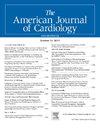The Role of Angiotensin Receptor/Neprilysin Inhibitor in Moderate Ischemic Mitral Regurgitation After Isolated Coronary Artery Bypass Grafting (ARNI-MIMIC): Study Protocol for a Randomized Controlled Trial
IF 2.1
3区 医学
Q2 CARDIAC & CARDIOVASCULAR SYSTEMS
引用次数: 0
Abstract
Debates have been existed regarding the treatment of moderate ischemic mitral regurgitation (IMR) in patients undergoing coronary artery bypass grafting (CABG). While it might have priority on reducing the risk of recurrent IMR, studies showed that concomitant mitral valve repair increases the risk of adverse outcomes, such as neurological events, as well as the in-hospital costs. In recent studies, angiotensin receptor/neprilysin inhibitor (ARNI) was discovered to have potential benefit in reducing the severity of IMR. The ARNI-MIMIC is a randomized controlled clinical trial aiming to reduce the risk of recurrent IMR in isolated CABG patients. A total of 220 eligible patients with moderate IMR will be allocated into control (non-ARNI) and intervention (ARNI) groups in a 1:1 pattern after isolated CABG. Patients in the intervention group will be administered with continuous sacubitril/valsartan for 6 months postoperatively, while patients in the control group will receive guideline recommended therapy only. All of the patients will be invited to complete 6-month follow-up. The primary endpoint is the change in the effective regurgitant orifice area (EROA) of the mitral valve, which is obtained by echocardiography and calculated by subtracting the follow-up EROA from the preoperative EROA. This trial aims to investigate the potential role of ARNI as compared to the control in moderate IMR patients undergoing isolated CABG. If ARNI is proven to reduce the risk of moderate IMR recurrence, patients will benefit from both improved life quality and decreased medical costs. The This study was approved by the Institutional Review Board of Fuwai Hospital on October 18th 2024, with an approval number of 2024-2446. The results of this trail will be disseminated through international academic conferences and publication in medical journals regardless of the study outcomes. ClinicalTrials.gov ID NCT06917664
血管紧张素受体/奈普利素抑制剂在孤立冠状动脉旁路移植术(ARNI-MIMIC)后中度缺血性二尖瓣反流中的作用:一项随机对照试验的研究方案。
关于冠状动脉旁路移植术(CABG)患者中度缺血性二尖瓣反流(IMR)的治疗存在争议。虽然它可能优先考虑降低复发性内膜复发的风险,但研究表明,伴随的二尖瓣修复增加了不良后果的风险,如神经事件,以及住院费用。在最近的研究中,血管紧张素受体-neprilysin抑制剂(ARNI)被发现在降低IMR严重程度方面具有潜在的益处。ARNI-MIMIC是一项随机对照临床试验,旨在降低孤立CABG患者复发性IMR的风险。总共220例符合条件的中度IMR患者将在孤立CABG后按1:1的比例分配到对照组(非ARNI)和干预组(ARNI)。干预组患者术后6个月持续给予苏比里尔/缬沙坦治疗,对照组患者仅接受指南推荐治疗。所有患者将被邀请完成6个月的随访。主要终点是二尖瓣有效返流口面积(EROA)的变化,该变化通过超声心动图获得,并通过术前EROA减去随访EROA计算。本试验旨在探讨与对照组相比,ARNI在接受孤立性冠脉搭桥的中度IMR患者中的潜在作用。如果ARNI被证明可以降低中度IMR复发的风险,患者将受益于改善的生活质量和降低的医疗费用。伦理审批与传播:本研究于2024年10月18日由阜外医院机构审查委员会批准,批准文号:2024-2446。无论研究结果如何,该试验的结果将通过国际学术会议和医学期刊上的出版物进行传播。试验注册:ClinicalTrials.gov编号NCT06917664。
本文章由计算机程序翻译,如有差异,请以英文原文为准。
求助全文
约1分钟内获得全文
求助全文
来源期刊

American Journal of Cardiology
医学-心血管系统
CiteScore
4.00
自引率
3.60%
发文量
698
审稿时长
33 days
期刊介绍:
Published 24 times a year, The American Journal of Cardiology® is an independent journal designed for cardiovascular disease specialists and internists with a subspecialty in cardiology throughout the world. AJC is an independent, scientific, peer-reviewed journal of original articles that focus on the practical, clinical approach to the diagnosis and treatment of cardiovascular disease. AJC has one of the fastest acceptance to publication times in Cardiology. Features report on systemic hypertension, methodology, drugs, pacing, arrhythmia, preventive cardiology, congestive heart failure, valvular heart disease, congenital heart disease, and cardiomyopathy. Also included are editorials, readers'' comments, and symposia.
 求助内容:
求助内容: 应助结果提醒方式:
应助结果提醒方式:


